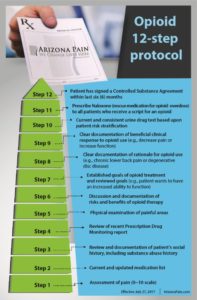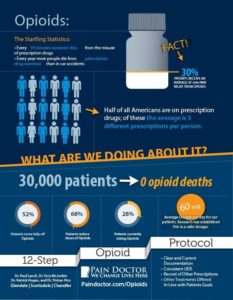Our Opioid Therapy Statement and Management Tool
Back in 1803 when morphine became a treatment option for neuralgic pain, opioids seemed like a miracle. Unfortunately, now we know that opioids carry with them a host of dangerous risks. Still, there are some patients for whom this treatment can provide relief and a return to normal daily activities. At Arizona Pain, our opioid therapy statement outlines not only the conditions for use of opioid treatment for our patients, but also other pain management strategies that can help.
Towards Safer Pain Management
The pain specialists at Arizona Pain are passionate about treating those who suffer from chronic pain. We empathize with chronic pain’s burden on you and those closest to you. We provide life-changing, intelligent, integrated, and comprehensive pain treatments.
Our comprehensive treatment plans reduce risks and maximize benefits. And, due to our commitment to providing our patients with the best possible care, we go to great lengths to protect our patients from the significant risks that are associated with opioid therapy.
We may only provide opioid therapy when the following criteria are met:
- Conservative treatments have failed
- Patient agrees to comply with regulations surrounding opioids and their use
- Underlying cause of symptoms will respond to opioid therapy
Our system of integrated care also provides alternatives to opioid therapy to manage and reduce pain. Arizona Pain’s approach includes:
- Accurate and careful diagnosis of underlying cause of pain
- Chiropractic care to correct misalignment in the body
- Behavioral therapy to improve mindset
- Non-pharmaceutical pain management interventions
- Conservative medication management
Together, these strategies work to reduce pain and improve your quality of life. We’re proud of the fact that due to our integrated care approach:
- 33% of our patients stop taking opioids altogether
- 60% of patients return to work
- 66% of patients are able to return to daily activities
At Arizona Pain, we know that if you suffer from pain, we can help. We successfully treat all forms of pain with our comprehensive treatment plans and adherence to our following opioid therapy statement and 12-step compliance checklist.
Our Opioid Therapy Statement
At Arizona Pain, we typically do not prescribe high doses of opioid medications as research continues to show that this regimen has greater risks for patients with few long-term benefits as compared to lower doses or other approaches.
Recent research supports a carefully monitored program of low-dose opioids for non-cancer chronic pain, especially when combined with other treatment strategies and where those strategies alone have been ineffective.
That said, there is still ample evidence that high-dose opioid therapy for non-cancer chronic pain offers more risk than pain relief, including:
- Overdose
- Dependence
- Accidents
This same research indicates that these risks are dose dependent. That means that higher doses over longer periods of time put patients at greater risk for adverse effects.
Regardless of dose, we stringently follow DEA recommendations regarding prescribing opioid medications. To learn more, read our full post on opioids.
Our 12-Step Compliance Checklist
To make sure our patients who are prescribed opioids stay safe and have optimal chances for treatment success, we rely on our opioid therapy 12-step checklist.
For opioid use, we must have:
- Assessed pain on a 0-10 scale
- Received a current and updated medication list
- Reviewed documentation of patient’s social history, including substance abuse history
- Reviewed recent prescription drug monitoring report
- Physically examined painful areas
- Discussed and documented risks and benefits of opioid therapy
- Established goals of opioid treatment and reviewed goals (e.g., patient wants to have an increased ability to function)
- Clearly documented rationale for opioid use (e.g., chronic lower back pain or degenerative disc disease)
- Clearly documented beneficial clinical response to opioid use (e.g., decrease pain or increase function)
- Schedule current and consistent urine drug tests based upon patient risk stratification
- Prescribe naloxone (rescue medication for opioid overdose) to all patients who receive a prescription for an opioid
- Patient has signed a controlled substance agreement within last six months
This checklist keeps patients safe and provides the best chance of a positive treatment outcome.
We Change Lives Here
At Arizona Pain, we know that chronic pain can have a devastating impact on your daily life. Our opioid therapy statement offers clear guidelines for treatment with opioids and can help you make an informed choice about your pain management options.
To learn more about our opioid therapy statement and to begin your individualized treatment plan for chronic pain, get in touch today.



